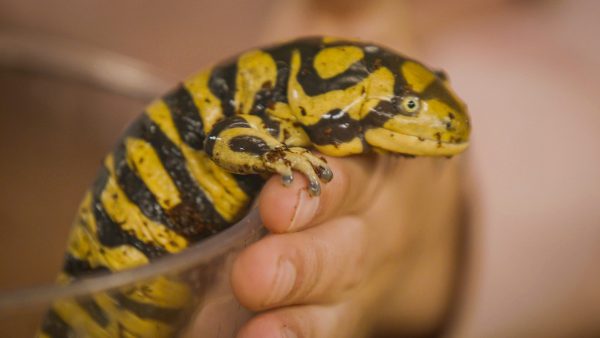Classify Definition
To classify is to sort organisms into groups based on shared traits, aiding in understanding their relationships. For example, classifying animals into species based on characteristics.
View Lesson on Classification of Living Things
Become a member to get full access to our entire library of learning videos, reading material, quiz games, simple DIY activities & more.
Become a member to get full access to our entire library of learning videos, quiz games, & more.
Plans & Pricingto watch this full video.

Access All Videos
and Lessons, No Limits.
Access All Videos

No credit card required,
takes 7 sec to signup.
No card required

Ready-to-go lessons
that save you time.
Ready-to-go lessons
If you are on a school computer or network, ask your tech person to whitelist these URLs:
*.wistia.com, fast.wistia.com, fast.wistia.net, embedwistia-a.akamaihd.net
Sometimes a simple refresh solves this issue. If you need further help, contact us.
Classification of Living Things
Fun Facts
- Bacteria are classified in their own domain because they lack a nucleus.
- Although a bat has wings, you wouldn't classify it as a bird because, in addition to wings, birds have feathers, beaks, and lay eggs.
- As DNA analysis improves, the classification of an organism can and does change.
Why Do We Need To Know About Classify
Learning about classification helps us understand the different kinds of life and why it’s important to organize them. Scientists like botanists (plant experts) and zoologists (animal experts) use classification to figure out diseases and know how living things depend on each other. This helps us know and recognize the many types of organisms around us, from the deep sea to our gardens.
Also, knowing how to group life forms helps us find new ones, like a shark that glows in the dark, and see how many different kinds there are, like how most of the life forms we know are bugs. By looking at DNA, scientists can find how organisms are related, leading to new medical treatments and helping to protect animals and plants. Organizing life in this way helps us understand the world better and pushes science forward.
Frequently Asked Questions
Check out the Full Lesson on Classification of Living Things
In this lesson, we learn that:
- Scientists classify living things based on shared traits.
- Classification helps us understand how living things are related.
- There are 8 levels of organization that scientists use to sort all living things.
Related Topics
- Absorbency Definition
- Bacteria Definition
- Bioindicator Definition
- Chemical Reaction Definition
- Chloroplasts Definition
- Classify Definition
- Computer Programming Definition
- Convection Definition
- Dichotomous Key Definition
- Divergent Boundary Definition
- Electricity Definition
- Energy Transfer Definition
- Evaporation Definition
- Hydrosphere Definition
- Inclined Plane Definition
- Information Transfer Definition
- Light Reflection Definition
- Light Year Definition
- Liquid Definition
- Marsupial Definition
- Material Definition
- Melting Definition
- Mineral Definition
- Molecule Definition
- Natural Disaster Definition
- Nervous System Definition
- Non-renewable Resource Definition
- Opposable Thumb Definition
- Parasitism Definition
- Plant Growth Definition
- Prey Definition
- Renewable Energy Definition
- Respiratory System Definition
- River Definition
- Scientific Name Definition
- Seed Dispersal Definition
- Seismologist Definition
- Solar Eclipse Definition
- Sound Wave Definition
- Species Definition
- Sun Definition
- Taxonomy Definition
- Texture Definition
- Trait Definition
- Volts Definition
- Watershed Definition
- Wave Reflection Definition
- Weather Map Definition


Start a Free Trial Today. Get a $5 Amazon Gift Card!
Teachers! Start a free trial & we'll send your gift card within 1 day. Only cards left. Try it now.
Select Grade
Select Subject
This email is associated with a Science Kit subscription. Kit subscriptions are managed on this separate page: Manage Subscription

-
Download InvoiceScience & Math$/yr
-
Download InvoiceScience Only$/yr

access all lessons
• No credit card required •
"My students loved the videos. I started the video subscription in May and used them as a review before the state test, which I know contributed to 100% of my class passing the state test."
Rhonda Fox 4th Grade Teacher, Ocala, Florida
Use Generation Genius in Your School
Access all lessons free for 30 days.
"My students loved the videos. I started the video subscription in May and used them as a review before the state test, which I know contributed to 100% of my class passing the state test."
Rhonda Fox 4th Grade Teacher, Ocala, Florida
• No credit card required •
Already a member? Sign In
* no credit card required *

* no credit card required *
* no credit card required *

Get District Quote
Discounts start at 3 schools.
Sent!
Thank you for your inquiry.
We will email you a quote as soon as we can.

to Discover the Benefits of Generation Genius
Learn How to Save for Your School & District!
Please login or create an account to access additional resources

no credit card required
Skip, I will use a 3 day free trial
Enjoy your free 30 days trial
-
Unlimited access to our full library
of videos & lessons for grades K-5. -
You won’t be billed unless you keep your
account open past your 14-day free trial. -
You can cancel anytime in 1 click on the
manage account page or by emailing us.
-
Unlimited access to our full library of videos & lessons for grades K-5.
-
You won't be billed unless you keep your account open past 14 days.
-
You can cancel anytime in 1-click on the manage account page.
Cancel anytime in 1-click on the manage account page before the trial ends and you won't be charged.
Otherwise you will pay just $10 CAD/month for the service as long as your account is open.
Cancel anytime on the manage account page in 1-click and you won't be charged.
Otherwise you will pay $10 CAD/month for the service as long as your account is open.
We just sent you a confirmation email. Enjoy!
Done



























































































































 GENERATION GENIUS
GENERATION GENIUS